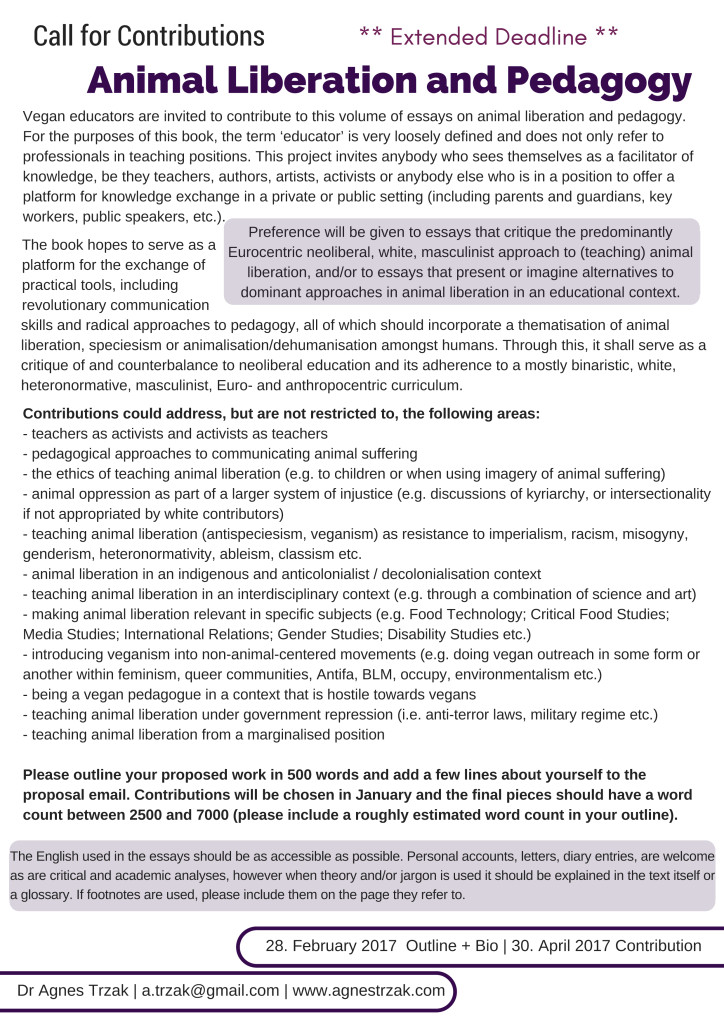Deadlines: 28. February 2017 Outline + Bio | 30. April 2017 Contribution
Vegan educators are invited to contribute to this volume of essays on animal liberation and pedagogy. For the purposes of this book, the term ‘educator’ is very loosely defined and does not only refer to professionals in teaching positions. This project invites anybody who sees themselves as a facilitator of knowledge, be they teachers, authors, artists, activists or anybody else who is in a position to offer a platform for knowledge exchange in a private or public setting (including parents and guardians, key workers, public speakers, etc.).
The book hopes to serve as a platform for the exchange of practical tools, including revolutionary communication skills and radical approaches to pedagogy, all of which should incorporate a thematisation of animal liberation, speciesism or animalisation/dehumanisation amongst humans. Through this, it shall serve as a critique of and counterbalance to neoliberal education and its adherence to a mostly binaristic, white, heteronormative, masculinist, Euro- and anthropocentric curriculum.
Preference will be given to essays that critique the predominantly Eurocentric neoliberal, white, masculinist approach to (teaching) animal liberation, and/or to essays that present or imagine alternatives to dominant approaches in animal liberation in an educational context.
Contributions could address, but are not restricted to, the following areas:
– teachers as activists and activists as teachers
– pedagogical approaches to communicating animal suffering
– the ethics of teaching animal liberation (e.g. to children or when using imagery of animal suffering)
– animal oppression as part of a larger system of injustice (e.g. discussions of kyriarchy, or intersectionality if not appropriated by white contributors)
– teaching animal liberation (antispeciesism, veganism) as resistance to imperialism, racism, misogyny, genderism, heteronormativity, ableism, classism etc.
– animal liberation in an indigenous and anticolonialist / decolonialisation context
– teaching animal liberation in an interdisciplinary context (e.g. through a combination of science and art)
– making animal liberation relevant in specific subjects (e.g. Food Technology; Critical Food Studies; Media Studies; International Relations; Gender Studies; Disability Studies etc.)
– introducing veganism into non-animal-centered movements (e.g. doing vegan outreach in some form or another within feminism, queer communities, Antifa, BLM, occupy, environmentalism etc.)
– being a vegan pedagogue in a context that is hostile towards vegans
– teaching animal liberation under government repression (i.e. anti-terror laws, military regime etc.)
– teaching animal liberation from a marginalised position
Please outline your proposed work in 500 words and add a few lines about yourself to the proposal email. Contributions will be chosen in January and the final pieces could have a word count between 2500 and 7000 (please include a roughly estimated word count in your outline).
The English used in the essays should be as accessible as possible. Personal accounts, letters, diary entries, are welcome as are critical and academic analyses, however when theory and/or jargon is used it should be explained in the text itself or a glossary. If footnotes are used, please include them on the page they refer to.
Email Dr Agnes Trzak | a.trzak@gmail.com
